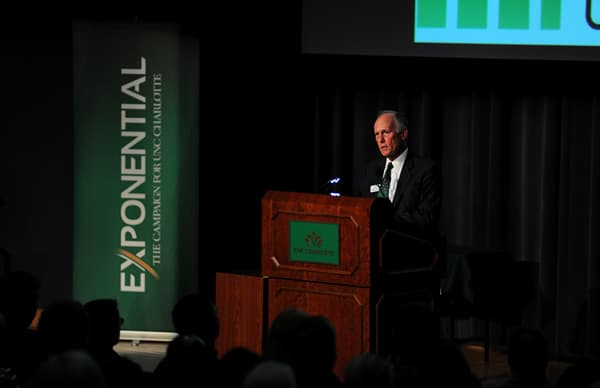
At this year’s annual University Convocation, UNC Charlotte Chancellor Philip L. Dubois expressed the need to “stand behind the power of education.”
He stated, “Our approach to last year will be our approach this year, fully committed to a campus culture where our differences are celebrated as part of a vigorous intellectual community dedicated to academic freedom, robust debate and mutual respect.”
Growth and the promise of the future also were important themes that the chancellor stressed. He noted that UNC Charlotte enrollment could “approach or top 29,000 students this fall,” and funding received for enrollment increases “permits us to continue to expand our investment in new academic programs to serve the educational needs of the greater Charlotte region, one of the fastest-growing areas in the nation.”
New graduate offerings include master’s degrees in cybersecurity, management and respiratory care and proposals are underway for master’s programs in architecture and athletic training and a doctoral program in civil engineering.
Dubois said while a law school is not envisioned given the current employment market for those with a J.D., “we do think there may be a need for graduate-level programming in legal studies.” Conversations have begun with UNC School of Law about a joint graduate-level and certificate program in legal studies.
Dodging orange construction cones and dump trucks will continue, the chancellor noted. He outlined a number of projects either in progress or scheduled, including the Health and Wellness Center, the Student Union Parking Deck Expansion and the Undergraduate Admissions Center.
With the University’s exponential growth, traffic congestion has become a concern. Last year, the chancellor appointed a task force to review campus congestion, and the committee delivered a report with 34 recommendations.
One with “broad consequences” is the scheduling of classes. Starting in fall 2018, the University will revert to a schedule that includes a more robust set of offerings on Mondays, Wednesdays and Fridays, including the use of 50-minute classes between 8 a.m. and 2:15 p.m. Faculty members will have the opportunity to offer 1 hour and 15 minute classes on any two-day combination of Mondays, Wednesdays and Fridays after 2:30 p.m.
Light rail’s arrival is expected to improve campus congestion, and in preparation, the University is implementing the Niner Transit system “to move folks getting off or on a light rail train every seven to 10 minutes during peak hours.” There are three Niner Transit routes with enhanced service starting Monday, Aug. 21. A free mobile app is available to view bus locations and arrival information.
“We certainly hope that faculty, staff and students will take the option of light rail … Faculty and staff will have the option to purchase an unlimited all-access pass for $75. Your UNC Charlotte ID card will carry the transportation app to ensure that you can simply tap the ticket validators on each train and get to your destination without purchasing a ticket at the station platform,” noted Dubois. Starting with the spring semester, students will be assessed an annual fee of $50 for unlimited rides on light rail, including transfers to and from any form of CATS public transportation.
In closing his “lucky 13th” University Convocation, Dubois said, “I remain truly optimistic about our future together and the continuation of an affirming campus culture that for many decades has embraced the productive discussion of ideas, collaboration and collegiality.”
University Convocation speakers also included Provost Joan Lorden, Staff Council Chair Penny Stevens, Student Body President Tracey Allsbrook and Faculty President Richard Leeman.
As part of the event, full professors are recognized and awarded Jefferson Cups, engraved with the University logo, faculty members’ names and the year of presentation.
This year’s honorees were: John Allemeier and Randy Haldeman, music; Harry Campbell Jr. and Martha Eppes, geography and earth sciences; Anthony Fodor and ZhengChang Su, bioinformatics and genomics; Heather Freeman, art and art history; Yaorong Ge, Celine Latulipe, Heather Lipford and Yongge Wang, software and information systems; Virginia Gil-Rivas, psychological science; Sukumar Kamalasadan, electrical and computer engineering; Scott Kissau, middle, secondary and K-12 education; Shelley Listwan, criminal justice and criminology; Brigid Mullany, Peter Tkacik and Naiquan Zheng, mechanical engineering and engineering science; Sungjune Park, business information systems and operations management; Andrew Polly, reading and elementary education; Elizabeth Racine, public health sciences; Joanne Robinson, religious studies; Steven Sabol, history; Clifton Scott, communication studies; and Min Shin, computer science.